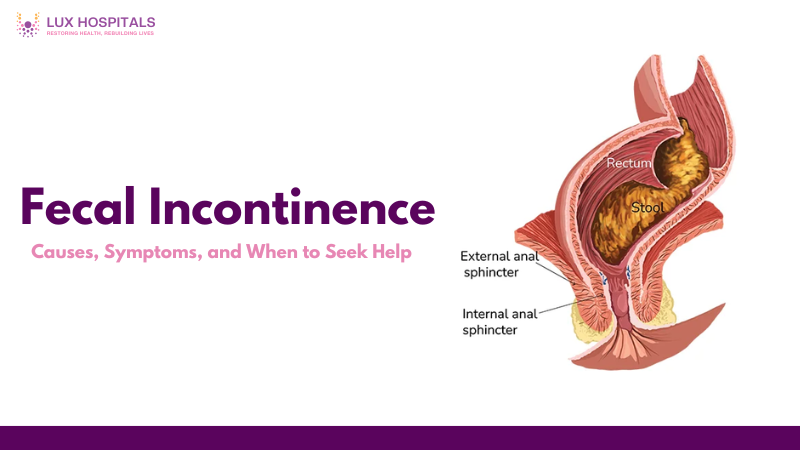Understanding Fecal Incontinence: Causes, Symptoms and Treatments

Fecal incontinence is a disorder where the inability to regulate bowel movements causes unexpected stool leakage. This illness may significantly impact a person’s quality of life, leading to emotional distress and social embarrassment. Understanding the causes, symptoms, and available treatments is crucial for effective management. Although it is more common among older adults, it can impact individuals of any age, including women after childbirth and people with neurological or gastrointestinal disorders.
What is fecal incontinence?
The term “fecal incontinence” describes the involuntary exit of stool, ranging from occasional leakage while passing gas to a complete loss of bowel control. It may be caused by several things, such as nerve injury, muscle damage, or other underlying health conditions. Although elderly persons are more likely to have the illness, it can affect individuals of all ages.
Fecal incontinence is the inability to control bowel movements, leading to accidental leakage of stool (feces). This condition can range from occasional leakage while passing gas to a complete loss of control over bowel movements.
Causes of Fecal Incontinence
Several factors can contribute to the development of fecal incontinence:
- Muscle Damage: Anal sphincter muscle damage, often occurring during childbirth, can impair bowel control.
- Nerve Damage: Disorders, including diabetes, multiple sclerosis, and damage to the spinal cord, may cause nerve damage that regulates bowel movements.
- Chronic Constipation: Fecal incontinence may result from the pelvic floor muscles deteriorating due to frequent straining.
- Diarrhea: It is more challenging to manage loose stools, which raises the possibility of leaks.
- Age-Related Changes: As people age, their rectal muscles may become less toned and their nerves less sensitive.
Symptoms of Fecal Incontinence
The symptoms can range in intensity and include unexpected gas or stool leakage.
- Defecation is urgent and requires minimal notice.
- Unable to make it to the restroom in time.
- Unintentional underwear soiling.
- Skin irritation, rashes, or infections around the anal area.
- Frequent bowel accidents, especially during physical activity or sleep.
- Bloating or abdominal discomfort accompanied by leakage.
- Feelings of incomplete evacuation after a bowel movement.
Anus-related skin irritation brought on by frequent leaks
Diagnosing fecal incontinence involves a comprehensive evaluation
- Medical History: Discussion of symptoms, dietary habits, and medical background.
- Physical Examination: Assessment of anal sphincter muscle strength and rectal sensation.
- Diagnostic Tests: Procedures like anorectal manometry, endoanal ultrasound, or MRI may be utilized to assess muscle and nerve function.
Treatment Options
The underlying cause of fecal incontinence determines how to treat it. And intensity:
- Dietary Changes: Consuming more fiber can aid in controlling bowel movements.
- Medication: Doctors may prescribe laxatives or anti-diarrheal medications to control stool consistency.
- Exercises for the Pelvic Floor: Exercises that build muscle can enhance muscle control.
- Biofeedback Training:Patients who use biofeedback therapy can become more conscious of and in control of their pelvic floor muscles.
- Surgical Interventions: In extreme circumstances, sacral nerve stimulation or sphincteroplasty may be considered.
Living with Fecal Incontinence
Fecal incontinence management requires both emotional and physical coping mechanisms.
- Skin Care: Maintaining hygiene to prevent irritation.
- Use of Protective Garments: Wearing pads or specialized underwear can provide security.
- Psychological Support: Emotional difficulties can be addressed with counselling or support groups.
Prevention
Among the preventive actions are
- Frequent exercise: improves intestinal function and muscle tone.
- Balanced Diet: Proper digestion is supported by enough fiber and water.
- Early Intervention for Digestive Disorders: Complications can be avoided by treating constipation or diarrhea as soon as possible.
Conclusion
Fecal incontinence can be a distressing and life-altering condition, but it does not have to be silently endured. With the right medical advice, lifestyle modifications, and occasionally therapeutic or surgical procedures, people can regain control and confidence in their everyday lives. It is important to remember that help is available and that this disease is more common than most people think. By candidly discussing and dealing with fecal incontinence, people can lessen stigma and enhance public awareness and personal health.
Frequently Asked Questions
Common causes include Damage to the anal sphincter muscles, which may occur during childbirth or due to trauma or surgery in the rectal area. Nerve damage caused by illnesses, including diabetes, multiple sclerosis, or spinal injuries, can also impair the ability to control bowel movements.
Absolutely. Changes such as increasing dietary fiber, avoiding trigger foods (like caffeine or dairy), and practicing regular bowel habits can improve consistency and reduce episodes. Pelvic floor exercises, guided by a specialist, can aid in strengthening the bowel control muscles, and wearing protective garments may provide additional confidence during daily activities.
While fecal incontinence is more frequently observed, it shouldn’t be seen as a natural occurrence in elderly folks or an inevitable part of aging. Many older individuals maintain complete bowel control, and incontinence often signals an underlying medical issue that can be addressed.
You should consult a healthcare provider if you experience frequent bowel leakage, urgent defecation needs that are hard to control, or if it interferes with your quality of life. Delaying medical consultation can result in worsening symptoms or skin damage from frequent exposure to stool.
Yes, there are several surgical interventions available for individuals with severe or treatment-resistant fecal incontinence. Options include sphincteroplasty (repairing a damaged anal muscle), sacral nerve stimulation (electrical stimulation to improve bowel control), or the implantation of an artificial bowel sphincter.




















